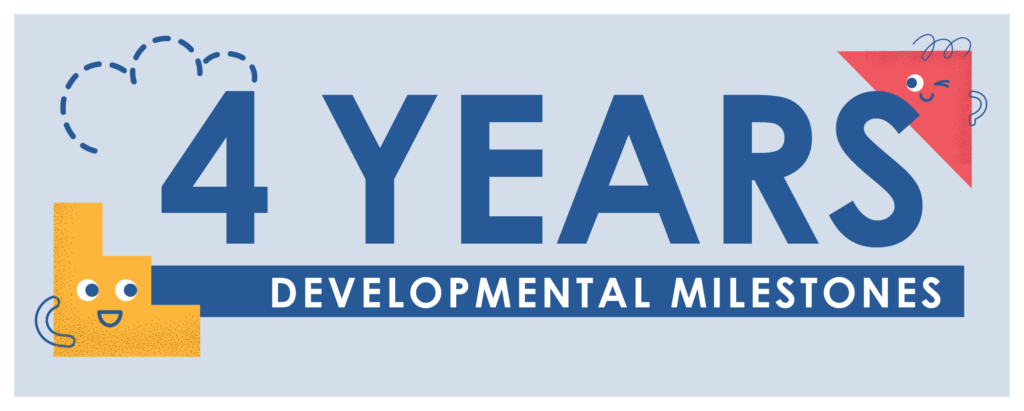
The way your child learns, plays, and acts shows you important steps in development. All children grow and develop at their own rate. However, most follow a predictable skill path along the way. These skill paths are called developmental milestones; skills that most children can perform by a certain age. Refer to the checklist below to determine what milestones your child has completed by four years of age.
By four years most children:
Fine Motor (skills that require balance and movement of small muscle groups)
_ Assemble puzzles.
_ Print some letters.
_ Cut on a line with scissors.
_ Copy drawing squares.
Cognitive (memory, problem solving, thinking, and overall play)
_ Name some colors and numbers.
_ Remember parts of a story.
_ Understand the idea of same and different.
_ Play simple board or card games.
_ Tell what they think will happen next in a book.
Communication
_ Speak in complex sentences “Mommy opened the door and the dog ran out.”
_ Understand words relate to each other (if, when, why).
_ Tell stories.
Social-Emotional
_ Take turns, share, cooperate
_ Express emotions through words rather than actions.
_ Can feel jealousy.
_ Begin to understand the concept of lying.
_ Enjoy pretending.
Gross Motor
_ Summersaults, jump on one foot, gallop.
_ Easily catch, throw and bounce a ball.
_ Run well without falling, tripping, or bumping into things.
Self-Care
_ Brush their teeth, comb their hair, and dress with little help.
_ Pour something to drink with little spilling or help.
Developmental Milestones: 4 years
Talk to your doctor or contact an early intervention program in your community if you notice any of the following signs of a possible developmental delay in your child of four years of age.
_ Can’t jump in place.
_ Shows no interest in interactive games or pretend play.
_ Resists dressing, feeding, or using the toilet.
_ Avoids contact with other children or adults.
_ Can’t retell a favorite story.
_ Doesn’t use “me” and “you” correctly.
_ Doesn’t speak clearly.
_ Loss of skills.
ASQ. Ages and Stages Questionnaires, Third Edition (ASQ – 3)
CDD. Centers for Disease Control <www.cdc.gov>
D’Eugenio, Diane and Rogers, Sally J. Early Intervention Developmental Profile (EIDP). 1981. University of Michigan.


Leave a Reply